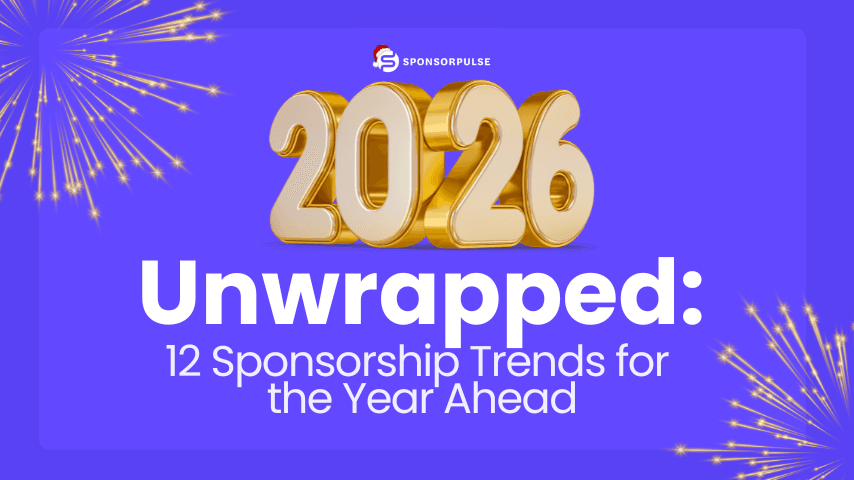Building Equity through Sponsorship: Why Ownable IP Creates Lasting Brand Impact

In today’s cluttered sponsorship landscape, brands that move beyond simple logo placement to create ownable, authentic experiences are the ones building lasting equity and deeper consumer connections.
The Challenge Every Brand Faces in Today's Cluttered Market
So, your brand just signed a major sponsorship deal, the logo placement looks great, and the initial buzz feels promising. But six months later, do consumers remember your involvement?
Sponsorship accounts for $90B+ annually worldwide with significant growth projected for years to come, yet many brands struggle to create lasting impact beyond. While traditional sponsorship continues to drive results, the brands creating the most meaningful connections aren't just activating assets - they're building something entirely their own.
Sponsorship fundamentally works at driving attitudinal and behavioral change. Among Canadians aged 13-24, 64% agree that they purchase brands because the brand sponsored something I follow, while 60% agree that they purchase brands because it was a product they saw sponsoring an event they follow. This isn't about logo visibility or driving up earned media impressions, it's about authentic connection through shared values and experiences. But in an increasingly noisy marketplace, passive sponsorship often gets lost in the shuffle.
Brands that simply attach their name to existing properties may see short-term awareness bumps and accompanying positive impact on purchase consideration and/or brand favourability, but they're missing the opportunity to create something distinctive and memorable that will last.
The solution lies in evolving beyond traditional sponsorship models toward ownable intellectual property that puts your brand at the center of the experience. When we analyze the most successful long-term brand partnerships, we consistently see these strategic approaches:
1. Create signature programs that solve real problems
RBC Training Ground exemplifies this perfectly. Rather than simply sponsoring existing athletic events, RBC created an entirely new platform that identifies and develops Olympic potential, building on its longstanding partnership with the Canadian Olympic Committee. Since launch, the program has tested 14,000+ athletes and identified 21 Olympians, positioning RBC as integral to Canada's sporting success. The engagement numbers tell the real story: by the first half of 2025, approximately 1-in - 4 (23%) Canadians have engaged with RBC Training Ground in the past 12 months - representing a remarkable 64% growth since H1 2019.
2. Build community-centered platforms
With its decade-plus-long-run, Kraft Hockeyville demonstrates how ownable IP can strengthen community ties while building brand affinity. The program has awarded $4.8M+ to 97 communities across Canada, revitalizing community hubs while positioning Kraft as a champion of grassroots hockey culture. Our data reveals the true scale of this connection: an average of 1- in - 4 (26%) consumers engage with Kraft Hockeyville every year – converting to over 6.46 million Canadians annually.
3. Develop purpose-driven experiences with measurable impact
Tim Hortons Camp Day shows how consistent, values-driven IP that connects to community creates compound returns. Since 1991, the program has raised $250M+, funding life-changing camp experiences while reinforcing Tim Hortons' connection to Canadian community values. The engagement metrics demonstrate exceptional reach: an average of 2-in-5 (43%) consumers engage with Tim Hortons Camp Day every year - converting to over 10.36 million Canadians.
Real-World Results: When Ownership Drives Outcomes
The difference between sponsorship and ownership becomes clear when we examine longevity and impact. Traditional sponsorships often end when contracts expire, leaving questions of how long an association can last with that audience.
Consider RBC Training Ground's evolution: what began as a talent identification program has become synonymous with Olympic development in Canada. Athletes, coaches, and sports fans now associate RBC directly with high-performance sport, creating brand equity that extends far beyond any single event or activation.
Similarly, Kraft Hockeyville has transcended typical sponsorship boundaries. Communities across Canada actively engage with the brand through the program, creating authentic emotional connections that drive both immediate sales and long-term loyalty.
Making the Shift: From Sponsor to Owner
The transition from traditional sponsorship to ownable IP requires strategic thinking and patient investment. Start by identifying authentic connections between your brand values and audience needs. Look for gaps in existing experiences where your brand can add genuine value.
Focus on creating programs that can evolve and grow over time. The most successful IP partnerships we measure aren't one-off campaigns - they're platforms that deepen and expand their impact year after year.
The data consistently shows that consumers respond more positively to brands they perceive as genuine contributors rather than opportunistic sponsors. Ownable IP transforms your brand from a logo to an integral part of experiences people genuinely value.
Ready to explore how ownable IP could transform your sponsorship strategy? Connect with our SponsorPulse team to discuss how data-driven insights can guide your evolution from sponsor to experience owner.


